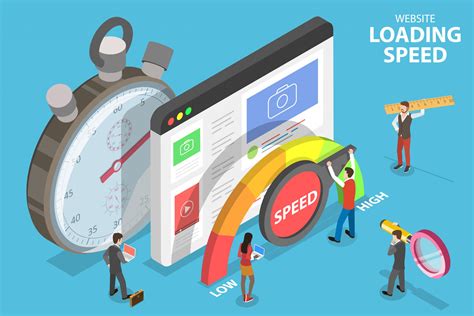In today's digitally-driven world, having a strong online presence is crucial for the success of any business or organization. As the competition in the virtual marketplace continues to intensify, it becomes essential to optimize your website's performance in search engines. Enhancing your website's search ranking is not an elusive dream anymore if you follow these five straightforward yet highly effective methods.
When it comes to improving your website's visibility on search engines, content is undeniably king. Compelling and relevant content not only engages visitors but also attracts search engine algorithms. By incorporating strategically placed keywords and phrases into your content, you can significantly enhance your website's chances of appearing at the top of search results.
One vital aspect that often goes unnoticed in search engine optimization (SEO) is the importance of link building. Building a network of high-quality and credible incoming links can undoubtedly boost your website's authority and credibility. By earning backlinks from reputable sources, you not only improve your website's search ranking but also increase its exposure to a wider audience.
Improve Your Website's Loading Speed for Optimal Performance

In today's digital landscape, it is crucial for websites to load quickly and efficiently. A fast loading speed not only enhances user experience but also improves search engine optimization. By optimizing your website's loading speed, you can ensure that visitors have a seamless browsing experience and search engines recognize your site as reliable and trustworthy.
Invest in Reliable Web Hosting
Choosing a reliable web hosting provider is the first step towards optimizing your website's loading speed. Look for a provider that offers fast server response times, ample bandwidth, and reliable uptime. A high-quality hosting service will ensure that your website is consistently accessible and loads quickly for all users.
Cache and Compress Your Website's Content
To further enhance your website's loading speed, consider utilizing caching mechanisms and compressing your content. Caching allows certain elements of your website to be stored in a user's browser, reducing the need for repetitive requests to the server. Additionally, compressing your website's files and images can significantly decrease loading times without compromising on quality.
Optimize Your Website's Code
Efficient code is essential for improving your website's loading speed. Minifying and combining CSS and JavaScript files can reduce file sizes and improve loading times. Additionally, consider removing unused or unnecessary code, optimizing database queries, and employing asynchronous loading techniques for non-essential scripts to further enhance your website's speed.
Optimize Images for Web
Images play a vital role in engaging website visitors, but they can also contribute to slower loading times. By optimizing images for the web, you can strike a balance between visual appeal and loading speed. Resize and compress images to an appropriate size and use formats such as JPEG or PNG, which offer a good balance between quality and file size.
Monitor and Analyze Website Performance
Regularly monitoring and analyzing your website's performance is crucial to identify areas for improvement. Utilize tools like Google Analytics to track loading times and gain insights into user behavior. By identifying slow-loading pages or elements, you can take necessary steps to optimize and improve your website's loading speed.
Improving your website's loading speed is a continuous process that requires attention to detail and a commitment to providing the best user experience possible. By implementing the steps outlined in this section, you can ensure that your website loads quickly, improving user satisfaction and search engine visibility.
Create High-Quality and Relevant Content
When it comes to improving your website's visibility in search engine results, one of the most important factors is the quality and relevance of your content. Creating content that is both informative and engaging can greatly contribute to attracting more organic traffic to your site.
High-quality content refers to information that is accurate, well-researched, and valuable to your target audience. It should offer unique insights, cover topics comprehensively, and provide practical solutions to their problems. By offering valuable content, you establish your website as a reliable source of information in your niche.
In addition to quality, relevance is another crucial aspect of your content. It should align with the interests and needs of your target audience. By understanding their preferences and concerns, you can create content that addresses their specific queries and provides relevant information. This relevance not only enhances the user experience but also helps search engines recognize the value of your website.
When creating high-quality and relevant content, it's important to focus on using appropriate keywords naturally throughout your text. By strategically incorporating relevant keywords, you can optimize your content for search engine crawlers and improve your chances of ranking higher in search results.
- Research your target audience's interests and preferences
- Create content that provides unique and valuable insights
- Ensure your content is accurate and well-researched
- Incorporate relevant keywords naturally throughout your text
- Regularly update your content to keep it fresh and current
In conclusion, creating high-quality and relevant content is essential for boosting your website's search visibility. By offering valuable insights, addressing your target audience's interests, and incorporating relevant keywords, you can enhance the user experience and improve your search engine rankings.
Enhance User Experience on Your Website

Creating an exceptional user experience is an integral part of improving your website's overall performance. By focusing on elements that enhance user satisfaction and engagement, you can maximize the potential of your website. In this section, we will explore effective strategies to optimize your website's user experience and keep visitors coming back for more.
1. Simplify Navigation Make it effortless for users to find the information they need by implementing a clear and intuitive navigation system. Utilize user-friendly menu structures, breadcrumbs, and logical categorization to guide visitors through your website's content. |
2. Enhance Page Load Speed Increase user satisfaction by optimizing your website's loading time. Compress images, minify CSS and JavaScript files, and leverage browser caching to reduce page load speed. Faster loading pages result in improved user experience and reduced bounce rates. |
3. Implement Responsive Design Ensure your website looks and performs seamlessly across different devices and screen sizes. Responsive design allows your content to adapt to various resolutions and orientations, providing a consistent user experience on desktops, tablets, and smartphones. |
4. Optimize Content Readability Create well-structured and easily scannable content to improve readability. Utilize headings, subheadings, bullet points, and short paragraphs to enhance the overall user experience. Use legible fonts and consider font size and color contrast for better accessibility. |
5. Personalize User Interaction Make visitors feel valued and engaged by providing personalized interactions. Implement features such as recommendation algorithms, customized newsletters, and tailored product suggestions to enhance user experience and encourage user loyalty. |
By implementing these strategies to improve the user experience on your website, you can create a positive impression on your visitors, increase their engagement, and boost the overall success of your online presence.
FAQ
How can I improve my website's search ranking?
To improve your website's search ranking, you can follow these 5 simple steps:
What is the importance of optimizing my website's content?
Optimizing your website's content is crucial for improving its search ranking.
How do backlinks impact my website's search ranking?
Backlinks play a crucial role in determining your website's search ranking.



